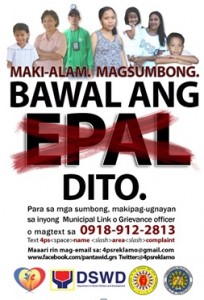DSWD can suspend “cash grants” of beneficiaries involved in campaign using the Pantawid Pamilyang Pilipino Program.
As Barangay election comes near, the DSWD tightened the guidelines, sanctions and referral system of the “Bawal ang Epal Dito” (BAED) Campaign.
Recently launched, BAED is a measure to protect the rights of Pantawid Pamilyang Pilipino Program beneficiaries against Barangay officials and electoral candidates who have direct and close influence to use the program.
In support, DSWD signed a Joint Memorandum Circular (JMC) No. 2013-001 with COMELEC and DILG for the BAED Campaign and Implementation Guidelines.
The JMC states the roles and functions of each agency in the campaign implementation especially on monitoring, reporting, investigating and providing guidelines on how to act upon grievances referred.
DSWD- FO1 Regional Director Marcelo Nicomedes J. Castillo emphasized that Pantawid Pamilya beneficiaries are not prohibited from supporting any electoral candidates. However, they are discouraged from showing support to any electoral candidate during the conduct of any Pantawid Pamilya related activities such as Family Development Sessions (FDS), Community Assemblies or Cash Grant Releases.
He added , ” We empower the public, especially the beneficiaries, by increasing their knowledge about the program mechanics and the selection and removal of households”.
Moreover, the Director reiterated the messages, “Walang karapatan ang kahit sino na mag-alis ng pangalan. Ang may karapatan lang ay ang DSWD Regional Office at National Office.” and “DSWD lang ang may karapatang tanggalin ang benepisyaryo sa Pantawid kung hindi siya susunod sa mga itinakdang kondisyon.
DSWD encourages everyone to text queries and concerns to Pantawid Pamilya Grievance Redress System (GRS) hotline by texting the numbers 09189122813.
Pantawid Pamilya is a conditional cash transfer program of the Philippine government which invests in human capital through health and education by providing cash grants to extremely poor households with children ages 0 – 14 years old (by: Allan O. Lulu / Information Officer II, Pantawid Pamilya).


